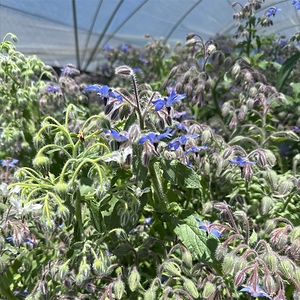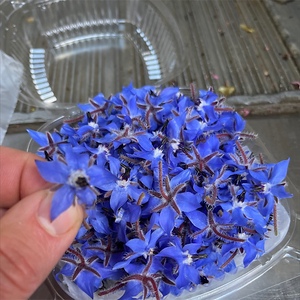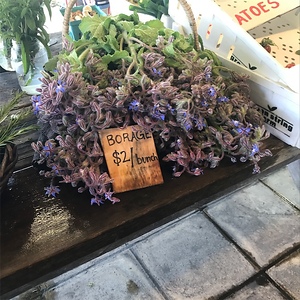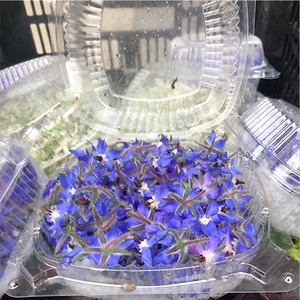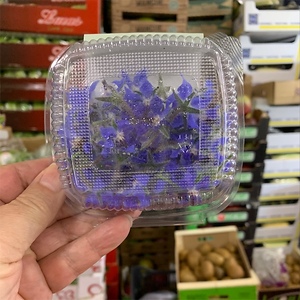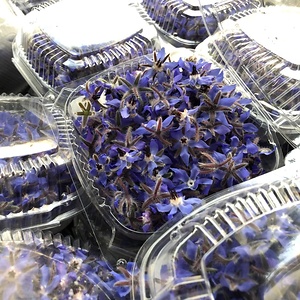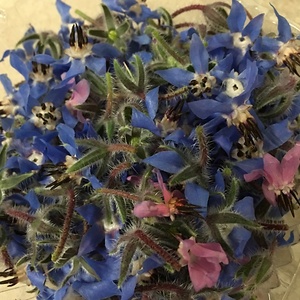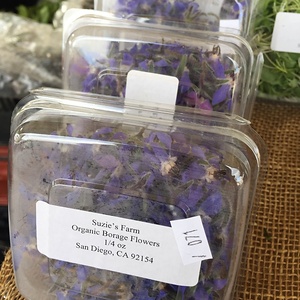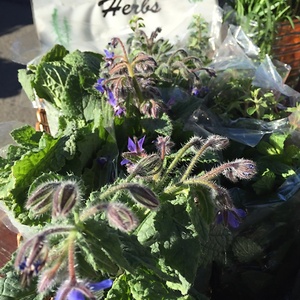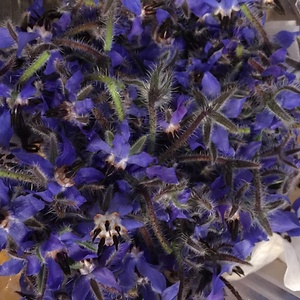


Borage Flowers
Estimated Inventory, 100 ct : 3.00
This item was last sold on : 07/31/25
| Fresh Origins | Homepage |
Description/Taste
Borage flowers grow in drooping clusters on slender, hollow stems covered in fine, white hairs. The small flowers consist of five-pointed petals, forming a star-like shape, and in the center of the flower, there are five prominent stamens and black anthers. Borage flowers also range in color from blue, lavender, to purple-pink with a white center, and the petals are soft and tender, offering a subtly crisp and succulent consistency. Beneath the flowers, there are many gray-green leaves covered in white hairs at maturity, and fuzzy green seed pods encase four small, black-brown seeds. Borage flowers have a sweet, honey-like flavor mixed with faint vegetal undertones. The leaves are also edible and contain a mild, herbal flavor reminiscent of cucumbers.
Seasons/Availability
Borage flowers are available in the late spring through the summer.
Current Facts
Borage, botanically classified as Borago officinalis, is an ancient herb known for its fuzzy leaves and showy flowers belonging to the Boraginaceae family. The plant is generally less than one meter in height, developing a broad, bushy nature, and is also known as Starflower, Bee Bread, and the Bee plant. There are two varieties encompassed under the Borage name, one plant with purple flowers and one plant with white. The purple flower cultivar is considered the more dominant and common variety found in gardens. Borage has been used in medicinal and culinary applications since ancient times, and the flowers are traditionally used as an edible garnish or subtle flavoring in syrups, desserts, beverages, and salads. In some parts of Europe, the plant is considered an aggressive weed, but the brilliant flowers are used to attract pollinators into home gardens in other regions.
Nutritional Value
Borage is a good source of vitamins A and C, antioxidants that boost the immune system, calcium to strengthen bones and teeth, potassium to balance fluid levels within the body, and iron to develop the protein hemoglobin to transport oxygen in the bloodstream. The plant also contains lower amounts of zinc, thiamine, magnesium, phosphorus, and folate. In European folk medicine, Borage leaves and flowers are used as a diuretic, sore throat aid, and natural remedy to exhaustion.
Applications
Borage flowers are showy, blue to purple flowers that are showcased when utilized fresh in raw preparations. The flowers can be added whole to fruit or green salads, layered into sandwiches, or they can be used as an edible garnish on cakes, cold soups, ice cream, and delicate pastries. Borage flowers can also be candied, mixed into dips, incorporated into beverages such as lemonade, white wine sangria, spritzers, and other cocktails, or the flowers can be frozen into ice cubes as an attractive element. In addition to fresh preparations, the flowers can be paired with the leaves and cooked into jellies or jams, stirred into sauces, steeped into a tea, or used to flavor pickle brine. Borage leaves can also be used similarly to spinach, bearing a light cucumber taste, and in Germany, the leaves are used as an herb in the famous Frankfurter green sauce gruene sosse. Borage flowers pair well with herbs such as dill, mint, lemon balm, parsley, and oregano, citrus, cucumbers, tomatoes, peas, bell peppers, and spinach. The flowers should be immediately consumed for the best quality and flavor and will only keep 1 to 3 days when stored in a sealed container in the refrigerator.
Ethnic/Cultural Info
Borage is known as the “herb of courage” and was used throughout history as a natural calming agent. Celtic warriors consumed wine mixed with Borage before going into battle to settle nervous energy, and knights during medieval times were often given a drink made of Borage flowers before crusades to instill bravery and lift the spirits. Borage flowers were also embroidered onto a portion of the knight’s outfit known as the jerkin as a reminder of happiness and bravery during the crusades. Later in 1597, Borage continued to be studied for its courage-boosting properties, and French herbalist John Gerard used the flowers in salads to improve happiness and reduce sorrow. Gerard also famously translated an old Latin verse about Borage, which read, “I, Borage, always bring delight or courage.”
Geography/History
Borage is native to the Mediterranean, primarily in the east near Syria, and has been growing wild since ancient times. The cultivar was spread across Europe in the early ages and also expanded into Northern Africa and Asia. For hundreds of years, Borage flowers were used in medicinal and culinary applications, believed to encourage happiness, and the flowers were recorded in medicinal texts in Ancient Rome, Ancient Greece, and the Middle Ages. Borage seeds were brought with European immigrants to the New World in the 17th century and were planted in home gardens. The plants later escaped cultivation and became naturalized along the east coast of the United States. Today Borage flowers are grown worldwide and have also been introduced to regions of New Zealand, Australia, South America, South America, and Canada for commercial and home garden cultivation.
Featured Restaurants
Restaurants currently purchasing this product as an ingredient for their menu.
| Pacifica Del Mar | Del Mar CA | 858-792-0505 |
| Wormwood | San Diego CA | 619-573-0289 |
| InterContinental San Diego | San Diego CA | 619-501-9400 |
| Saiko Sushi-Coronado | Coronado CA | 619-435-0868 |
| Lauberge Del Mar | Del Mar CA | 858-259-1515 |
| Giuseppe Restaurants & Fine Catering | San Diego CA | 619-436-7006 |
| Pacific Yacht Agents | Los Angeles CA | 808-214-0970 |
| Mission Pacific | Oceanside CA | 760-450-7864 |
| Beaumont's | San Diego CA | 858-459-0474 |
| Javier Plascencia (Animalon) | Bonita CA | 619-295-3172 |
| 31ThirtyOne by Deckman | San Diego CA | 619-495-9814 |
| Corbeaux Wine & Tea House | Temecula CA | 909-567-6109 |
| Fort Oak | San Diego CA | 619-795-6901 |
| Botanica | San Diego CA | 619-310-6320 |
| Ctzn | Solana Beach CA | 858-925-7141 |
| Tahona (Kitchen) | San Diego CA | 619-573-0289 |
| Inn at Rancho Santa Fe | Rancho Santa Fe CA | 858-381-8289 |
| Cosecha Local | San Diego CA | 646-132-5944 |
| Sago | Encinitas CA | 858-382-4047 |
| Ron Oliver | San Diego | 619-295-3172 |
| Mabel's Gone Fishing | San Diego CA | 619-228-9851 |
| Culinary Kitchen Catering and Events | Coronado CA | 619-798-8477 |
| US Grant Hotel Grill Bar | San Diego CA | 619-232-3121 |
| Moniker Coffee Company (Bar) | San Diego CA | 916-945-6721 |
| Urban Kitchen Catering | San Diego CA | 619-276-8803 |
| Better Buzz Coffee (La Jolla) | La Jolla CA | 619-269-4022 |
| Sushi Nekosan | La Jolla CA | 858-999-0999 |
| Gravity Heights Mission Valley - Bar | San Diego CA | 619-384-5993 |
Recipe Ideas
Recipes that include Borage Flowers. One




 Learn More...
Learn More...